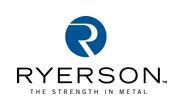Market Segment

May 7, 2020
Last Three Months Have Felt Like Three Years, Says Ryerson CEO
Written by Sandy Williams
Ryerson CEO Eddie Lehner says the last three months have felt like three separate years due to the shock of the COVID-19 pandemic: BCV (Before the Coronavirus), DCV (During the Coronavirus) and ACV (After the Coronavirus).
After a slow start to January due to weak demand from OEMs, the quarter gave way to a “pandemic tidal wave which gripped China in January and February, exponentially spread, and paralyzed North America in March,” said Lehner. BCV and DCV were dedicated to implementing plans and policies to safeguard the health and safety of the workforce “while preserving liquidity and recovery capacity through the crisis interval and aftermath.”
The company reduced warehousing, delivery, selling, general and administrative expense by $8.0 million driven by reductions in staffing-related expenses. Workforce numbers were reduced by 16 percent. Ryerson hopes to bring staff back as conditions improve.
It is difficult to gauge demand “because we are not used to this kind of demand shock that is so unparalleled,” said Lehner. The company has seen customers reopening and then closing because there was not a sufficient backlog to sustain operations. OEM communications on reopening can be mapped right back to demand, said Lehner. “It is one of those times that if you follow the headlines you can get a pretty good beat on what is going on.”
“With respect to ACV,” he added, “we remain hopeful and determined that as we collectively accelerate learning about the virus and continue building virus response infrastructure to combat and eventually eradicate the virus, we will see societal and economic conditions normalize to the better side of current projections.”
North American April shipments trended 25 percent below March while the pricing environment held up better than expected given the rapid decrease in demand and already below average commodity prices, he said.
Ryerson shipments were up 4.6 percent from Q4 to 566,000 tons but down 8.6 percent on a yearly basis. Revenue totaled $1.01 billion, up 5.2 percent from the previous quarter but down 10.2 percent from the prior year. Net income was $16.4 million. Average selling price was $1,785 per ton.
Ryerson declined to provide guidance on the second quarter due to macroeconomic uncertainty and “overall lack of visibility into future demand trends, metal pricing and market conditions in the end-markets.”
Based on prior experience in recessions, Ryerson expects that demand will continue to retract in the second quarter, stabilize in the third, and economic growth will rebound from depression levels in the fourth quarter and continue into 2021.
There is a “risk of economic false starts where demand-driven and virus-driven business continuity cannot be re-established with any consistency,” added Lehner.







